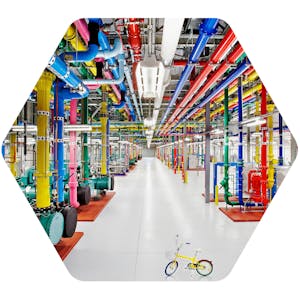Google Cloud Fundamentals: Core Infrastructure - 繁體中文 is a comprehensive course that provides an in-depth understanding of Google Cloud's key concepts and services. Through a combination of videos and hands-on labs, participants will explore and compare a variety of computing and storage solutions offered by Google Cloud. The course covers the selection and utilization of application deployment environments such as App Engine, Google Kubernetes Engine, and Compute Engine. Additionally, participants will gain insights into storage solutions including Cloud Storage, Cloud SQL, Cloud Bigtable, and Firestore.
Participants will also learn how to interact with Google Cloud services and gain knowledge about resource hierarchy, identity and access management, virtual machines, networking, containers, application development, deployment operations, as well as monitoring and logging operations within the Google Cloud environment. Whether you are new to Google Cloud or seeking to expand your knowledge, this course will equip you with valuable skills and insights to effectively leverage Google Cloud services for various business needs.
Certificate Available ✔
Get Started / More Info
Google Cloud Fundamentals: Core Infrastructure - 繁體中文 offers a comprehensive exploration of Google Cloud services, covering essential topics such as cloud computing, storage solutions, application deployment, and resource management. Through a series of modules, participants will gain practical knowledge and hands-on experience in utilizing Google Cloud for various business needs.
The course introduction provides an overview of the topics covered and sets the stage for the subsequent modules.
Module 2 delves into the fundamentals of Google Cloud, covering cloud computing, IaaS and PaaS, Google Cloud networking, security, open-source ecosystem, and pricing and billing aspects.
Module 3 focuses on resources and access control within Google Cloud, including the resource hierarchy, Identity and Access Management (IAM), service accounts, and interactions with Google Cloud.
Module 4 explores virtual machines and networking within Google Cloud, covering topics such as virtual private cloud networks, Compute Engine, cloud load balancing, and connecting networks to Google virtual private cloud.
Module 5 provides an in-depth look at storage solutions in Google Cloud, including Cloud Storage, Cloud SQL, Cloud Spanner, Firestore, and Cloud Bigtable, along with a comparison of storage solutions.
Module 6 focuses on containers, offering insights into containerization, Kubernetes, Google Kubernetes Engine, hybrid and multi-cloud, and Anthos.
Module 7 covers application deployment in Google Cloud, including App Engine, App Engine environments, Google Cloud API management tools, and Cloud Run.
Module 8 delves into development and deployment operations in Google Cloud, providing insights into cloud development, infrastructure-as-code deployment, and hands-on experience with Terraform for automated infrastructure deployment.
Module 9 focuses on logging and monitoring operations within Google Cloud, covering the importance of monitoring, performance and stability measurement, SLI, SLO, SLA, integrated observability tools, monitoring tools, logging tools, and error reporting and debugging tools.
The course summary wraps up the key learnings and insights gained throughout the modules, providing a comprehensive overview of the course content and its practical applications.
Advance your career in cloud architecture with the Preparing for Google Cloud Certification: Cloud Architect course. Gain hands-on experience and prepare for the...
Cloud Data Engineering is a comprehensive course teaching cloud-native technologies and best practices for developing data engineering applications. Students will...
Optimizing Your Google Cloud Platform (GCP) Costs is a comprehensive course designed for financial or IT professionals responsible for optimizing an organization's...
Introduction to Image Generation - Italiano provides an in-depth understanding of diffusion models, their real-world applications, and progress in non-conditioned...